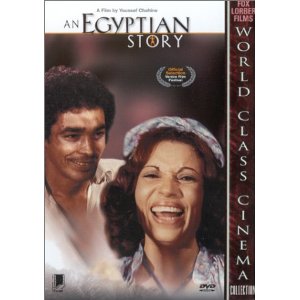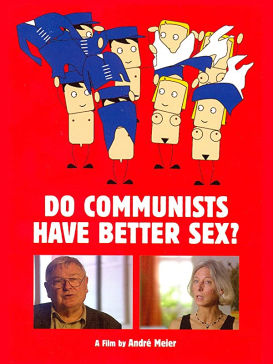Related Research Articles
In psychology, libido is psychic drive or energy, usually conceived as sexual in nature, but sometimes conceived as including other forms of desire. The term libido was originally used by the neurologist and pioneering psychoanalyst Sigmund Freud who began by employing it simply to denote sexual desire. Over time it came to signify the psychic energy of the sexual drive, and became a vital concept in psychoanalytic theory. Freud's later conception was broadened to include the fundamental energy of all expressions of love, pleasure, and self-preservation.

Youssef Chahine was an Egyptian film director. He was active in the Egyptian film industry from 1950 until his death. He directed twelve films that were listed in the Top 100 Egyptian films list. A winner of the Cannes 50th Anniversary Award, Chahine was credited with launching the career of actor Omar Sharif. A well-regarded director with critics, he was often present at film festivals during the earlier decades of his work. Chahine gained his largest international audience as one of the co-directors of 11'9"01 September 11 (2002).

Lesbian, gay, bisexual, and transgender (LGBT) people in Egypt face severe challenges not experienced by non-LGBT residents. There are reports of widespread discrimination and violence towards openly LGBT people within Egypt, with police frequently prosecuting gay and transgender individuals.

Richard Pacheco is an American former pornographic film and video actor, writer and director who retired from the X-rated business in the mid-1980s.

The history of erotic depictions includes paintings, sculpture, photographs, dramatic arts, music and writings that show scenes of a sexual nature throughout time. They have been created by nearly every civilization, ancient and modern. Early cultures often associated the sexual act with supernatural forces and thus their religion is intertwined with such depictions. In Asian countries such as India, Nepal, Sri Lanka, Japan, Korea, and China, representations of sex and erotic art have specific spiritual meanings within native religions. The ancient Greeks and Romans produced much art and decoration of an erotic nature, much of it integrated with their religious beliefs and cultural practices.

The Egyptian film industry is today based mainly in Cairo, which is sometimes referred to as Hollywood on the Nile or Hollywood of the East, despite having its beginnings in the city of Alexandria in the early 20th century. A strong industry grew in Egypt with a high distribution rate among the Arab world, and Cairo produces around three-quarters of the Arab world's screen output. It has had a large effect on the African and Arab film industry since the early 20th century.

The Yacoubian Building is a 2006 Egyptian film based on the novel of the same title by author Alaa Al Aswany. It has been reported to be the highest-budgeted film in the history of Egyptian cinema.
The Nature and Scope of the Problem of Sexual Abuse of Minors by Catholic Priests and Deacons in the United States, commonly known as the John Jay Report, is a 2004 report by the John Jay College of Criminal Justice, commissioned by the U.S. Conference of Catholic Bishops, based on surveys completed by the Roman Catholic dioceses in the United States. The initial version of the report was posted on the Internet on February 27, 2004, with corrections and revisions posted on April 16. The printed version was published in June 2004. The church's own John Jay Report is online at John Jay Report.

Khaled Youssef is an Egyptian director and film writer. His films are noted for their use of improvisation and a realistic cinéma vérité style. In a career spanning more than three decades, Youssef's films have encompassed many themes and genres. For several audiences, his films were an early prediction for 2010/2011 Arab uprisings. In his films, Youssef has addressed the issues of authoritarianism, lack social justice, poverty, religious intolerance, corruption, restrictions on the freedom of thoughts and opinion, and the sexual violence in the Egyptian and the Arab communities. As a result, he has been targeted by tens of judicial prosecutions and political harassments, motivated by different governments, over decades. Recently, He became a member of the Egyptian Parliament since November 2015.
Fairytale of Kathmandu is a 2007 documentary film by Neasa Ní Chianáin.

Bassem Raafat Mohamed Youssef is an Egyptian-American comedian, television host, and surgeon. Beginning his career with The B+ Show (2011), which was inspired by his experience during the 2011 Egyptian Revolution, he later rose to prominence as the host of El Bernameg (2011–2014), a satirical comedy show focused on Egyptian politics. In 2015, Youssef hosted the 43rd International Emmy Awards in New York City.
Private Dicks: Men Exposed is a 1999 American HBO TV documentary on the human penis. The film was directed by Thom Powers and Meema Spadola who previously made HBO's 1996 Breasts: A Documentary, a similar documentary on the breast.
The Rochdale child sex abuse ring involved underage teenage girls in Rochdale, Greater Manchester, England. Nine men were convicted of sex trafficking and other offences including rape, trafficking girls for sex and conspiracy to engage in sexual activity with a child in May 2012. This resulted in Greater Manchester Police launching Operation Doublet and other operations to investigate further claims of abuse. As of January 2024 a total of 42 men had been convicted resulting in jail sentences totalling 432 years. Forty-seven girls were identified as victims of child sexual exploitation during the initial police investigation. The men were British Pakistanis, which led to discussion on whether the failure to investigate them was linked to the authorities' fear of being accused of racial prejudice. The girls were mainly White British.

An Egyptian Story is a 1982 Egyptian drama film directed by Youssef Chahine. It was entered into the main competition at the 39th edition of the Venice Film Festival.

Not My Life is a 2011 American independent documentary film about human trafficking and contemporary slavery. The film was written, produced, and directed by Robert Bilheimer, who had been asked to make the film by Antonio Maria Costa, executive director of the United Nations Office on Drugs and Crime. Bilheimer planned Not My Life as the second installment in a trilogy, the first being A Closer Walk and the third being the unproduced Take Me Home. The title Not My Life came from a June 2009 interview with Molly Melching, founder of Tostan, who said that many people deny the reality of contemporary slavery because it is an uncomfortable truth, saying, "No, this is not my life."
Youssef Alimam is a freelance Egyptian filmmaker, musician, and model.
Soraya Bahgat is a Finnish-Egyptian social entrepreneur and women's rights advocate active in Egypt.

Do Communists Have Better Sex? is a 2006 German documentary film directed by André Meier. It compares the sexuality manifested by Germans during the period being divided into a Western and an Eastern part. The hypothesis manifested by scholars, interviews and footage is that sex was more free and women had more sexual pleasure in East Germany. The film discusses the possible reasons, considering the differences between the ideology and practical politics of a capitalist and a self-proclaimed communist regime.

Forbidden Women is a 1959 Egyptian drama film directed by Mahmoud Zulfikar. It is written by Amin Youssef Ghorab and Mahmoud Zulfikar, and stars Salah Zulfikar and Huda Sultan.
References
- ↑ "Documentary Libido Challenges Egyptians to Talk About Sex · Global Voices". globalvoices.org. Retrieved 2014-05-10.